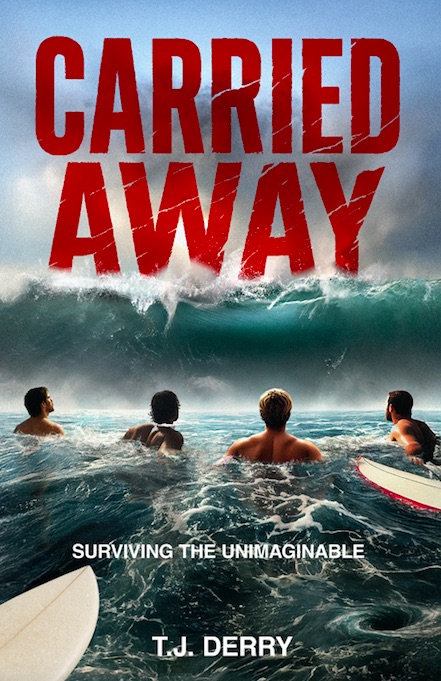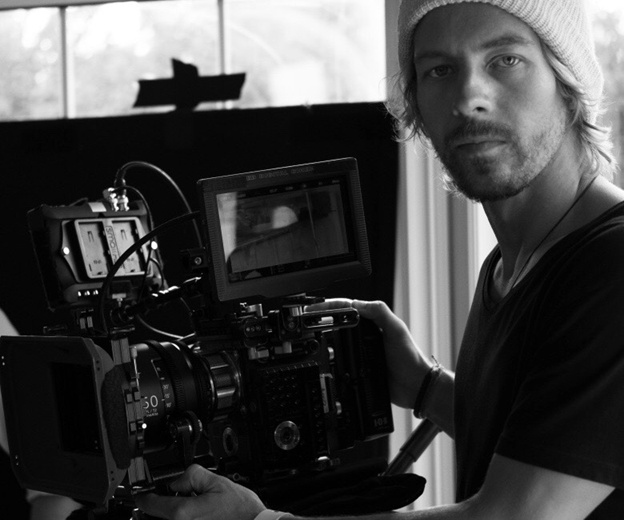In short—I couldn’t find the book I wanted to read, so I started writing it.
T.J. Derry – 13 November 2025
The Back Flap
tropical surf escape turns catastrophic when a tsunami hits, stranding four best friends in a fight for survival. Injured, disoriented, and cut off from the world, they face a brutal test no one could have prepared for.
For Cole, the trip was meant to be a reset—surf, sun, and nothing serious. But an unexpected connection with Kendal, a grounded, perceptive traveler, changes everything. Just as their romance begins to take root, disaster sweeps it all away.
Days stretch into an ordeal of dehydration, exposure, predators—and unraveling minds. The paradise they came to enjoy becomes a crucible that tests every instinct, bond, and belief.
About the book
What is the book about?
Carried Away is about a group of young travelers whose surf trip to the Mentawai Islands is shattered when they’re caught in the path of a catastrophic tsunami. Swept into the open ocean, beaten and broken, they cling to life on fractured boards and a makeshift raft, battling dehydration, predators, and the unraveling of their own minds. More than a survival tale, it explores friendship, longing, and purpose—and what people discover about themselves when comfort and certainty disappear.
When did you start writing the book?
I began writing Carried Away in the back of a reckless cab ride through Nicaragua at 2am in December 2017. The driver was nodding off, speeding through the jungle, and I was half convinced we wouldn’t make it—so I pulled out my phone and started typing, like a final journal entry in case we crashed. The opening of the second chapter was lifted straight from that night.
How long did it take you to write it?
It’s hard to say exactly. I “finished” in 2023—or at least I thought I had. But over those seven years I spent on the manuscript, a lot of that time I didn’t believe I could write a book. Most days I’d stare at the screen, looking for proof that it was going to be good enough. It wasn’t until a few years in that I finally let myself write freely, which ended up being a lot of fun. I actually finished the novel mid-2025.
Where did you get the idea from?
I was looking for the kind of fiction that would appeal to someone like me. There’s a lot of great work out there, but nothing that felt like the book I was searching for. So I started asking myself what exactly that was—and over the next few months, the idea slowly took shape. In short—I couldn’t find the book I wanted to read, so I started writing it.
Were there any parts of the book where you struggled?
It’d be easier to list the parts that weren’t a struggle, if I’m being honest. The hardest, though, was writing Cole’s confrontation with the tsunami, when all he has left are his own thoughts and emotions. Trying to capture the sensations—the sheer chaos as the waves arrive and tear him apart—felt almost impossible to get right.
What came easily?
Not much. The second chapter in that cab did, though—it was a lived experience, so pulling from it came a little more naturally and was really fun to write. Most of that happened in real life, and it flowed the way panic sometimes does: a blur of internal dialogue and fractured observations. The only other writing that felt less daunting was the dialogue. I’ve been mired in it for years working in film, so at least that part felt like home.
Are your characters entirely fictitious or have you borrowed from real world people you know?
You can’t move through life without people and places leaving their marks. The DNA of old friends and strangers I’ve crossed paths with is all through this in a general sense. Some of the things my friends have done, conversations I’ve had, woman I’ve known… it’s all lifted from somewhere. The book had to feel almost like reportage, and the characters needed to support that—to read like real people, or the whole thing would fall apart.
We all know how important it is for writers to read. Are there any particular authors that have influenced how you write and, if so, how have they influenced you?
I’m not sure I agree that a writer has to be a reader, at least not in the sense of constantly consuming literature. For my personality type, that’s actually the wrong move. If I want the words to sound authentic—like you’re reading something of mine and not a patchwork of borrowed voices—I have to avoid influence. If I reread something like Fight Club, suddenly Carried Away risks picking up its blunt, cynical rhythm. Some writers thrive on inspiration from others. I stayed shut off, to keep the voice from tilting me in any direction but my own.
Do you have a target reader?
These days there are a lot of very dark, political, social, and trauma-driven stories on the shelf. Don’t get me wrong—there’s clearly a market for them. But Carried Away isn’t built on commentary or allegory. It’s an adventure—a fun, exciting, and then suddenly brutally harrowing experience that drags you out to sea with it. At times it brushes against the things that make us human: connection, fear, love, meaning. Ideally it lets you disappear for a while and reminds you how lucky you are to be alive. If you need a break from the crazy world, if you want to get lost in something wild, then you’re who I wrote it for.
About Writing
Do you have a writing process? If so can you please describe it?
No—can you recommend one?
I wish I could say I did—it would’ve made my life a lot easier. The truth is, it was a chaotic mess. During the winters I usually take time from work and head for the tropics, which gives me long stretches of downtime. The one routine I fell into was after surfing in the mornings, I’d walk to a little hotel café, order a coffee and open my laptop. Some days it was quotes, bullet points, a scrap of dialogue, an off-color haiku. Other days I’d reread the previous pages and try to fix or re-write things. If there was any process at all, it was simply opening the laptop.
Do you outline? If so, do you do so extensively or just chapter headings and a couple of sentences?
I sketched the narrative in broad strokes, more like a three-act structure than a roadmap, but I didn’t lay out chapters or get stuck in the cycle of what’s next. I much prefer to explore on the page. Too much structure boxes me in. I’ve always liked leaving a little room for discovery on a film set, and it felt natural to do the same while writing.
Do you edit as you go or wait until you’ve finished?
I really did enjoy the process—it kept me entertained, gave me purpose while I was down south for the winters, or between film projects—but there was plenty of loathing mixed in. I’d love to say I hammered out a slop draft and came back later to clean it up, but my neurotic side never let that happen. So I wrote, rewrote, and reworked the same pages, over and over. I wouldn’t recommend it, but that’s how it went.
Did you hire a professional editor?
The editing was a bit of a tag-team. My inner circle read drafts and pointed out mistakes, redundancies, etc—while I tackled the story itself. The first “finished” draft was around 105,000 words; it stands now at about 86,000. A lot of digging up, cutting down, and torching pages to get it there.
Do you listen to music while you write? If yes, what gets the fingers tapping?
I did. Usually something that felt like the place—Sean Koch and Stick Figure were on heavy rotation early on. Other times it was just reggae or Latin music, anything to keep me in the tropical setting. Seven or eight years is a long time to sit with a book—by the end I had “Wild Trip” by DENM on repeat—songs on repeat are a personal quirk.
About Publishing
Did you submit your work to Agents?
I’ve always felt that when it’s time, the agent finds the writer, not the other way around. I did talk to a few when I first thought the book was done, but from what I gathered, COVID created a kind of maelstrom of manuscripts from people who suddenly had time to write. Most of the agents I spoke with seemed overwhelmed and/or disinterested. The publishing industry can be fickle—they often want a certain kind of book from a certain kind of person, the kind of triage that can miss something unique or exciting. I heard a lot of “Figure out which publisher’s looking for this type of fiction right now…” which made me even less interested in the traditional route. To me the most important piece was publicity anyway, so I found a publicist instead.
What made you decide to go Indie, whether self-publishing or with an indie publisher? Was it a particular event or a gradual process?
It was mostly necessity. Without a big name, a giant following, or some recognizable IP, I didn’t exactly feel like the kind of bet publishers were looking to make. I can’t really blame them, but it meant going my own way—which gave me full control over the writing, release date, cover—which I loved.
Did you get your book cover professionally done or did you do it yourself?
I put the cover together myself. Between film and photography I’ve picked up enough chops in photoshop to fake my way through it. It ended up as this Frankenstein of real photos, AI scraps, hand-drawn bits, and samples of sky and water I’d shot. By the end I’d stacked something like 300 layers. Messy, but it worked.
Do you have a marketing plan for the book or are you just winging it?
Books Forward is handling the bulk of the publicity. I’ll probably mess around with some ads too, though I use that word loosely. Film and photography are my métier, so it makes sense to lean on that to provide assets to my publicist to help get the word out.
Any advice that you would like to give to other newbies considering becoming Indie authors?
I’m maybe the last person who should be prescribing advice, but if I had to, I guess I can offer this–make sure you really want it. Even if you enjoy the process, it’s going to challenge you. Take the amount of work you think it’ll be, multiply it by fifty, then kiss your weekends and holidays goodbye. For me, the only real difference-maker was wanting it badly enough—there’s no secret sauce or hack I found. Being just stubborn enough to keep showing up was what it took.
And one more thing: be wary of AI. It has a way of dulling your perspective and flattening your voice. Writing is for the humans—the imperfections, the fingerprints, the cracks that let the light in, whichever cliché fits. Just don’t let a machine take that away.
End of Interview:
Get your copy of Carried Away from Amazon US or Amazon UK.



